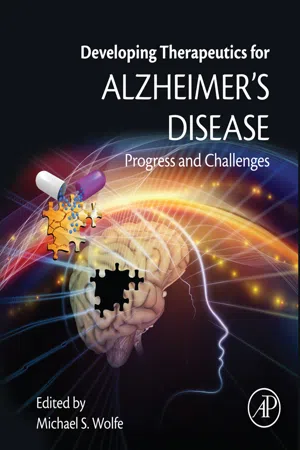
- 676 pages
- English
- ePUB (mobile friendly)
- Available on iOS & Android
About this book
Developing Therapeutics for Alzheimer's Disease: Progress and Challenges provides a thorough overview of the latest advances toward the development of therapeutics for Alzheimer's disease, along with the major hurdles that still must be overcome and potential solutions to these problems. Despite the lack of progress toward developing therapeutics that can slow or stop the progression of this disease, important discoveries have been made and many promising approaches are advancing in preclinical studies and clinical trials. This book outlines the special challenges related to specific targets and approaches, while presenting a realistic, comprehensive and balanced view of drug discovery and development in this area.Written by international leaders in the field, the book assesses prospects for the emergence of effective agents and allows readers to better understand the challenges, failures, and future potential for research in Alzheimer's disease. This book is a valuable resource to academic scientists carrying out translational research in Alzheimer's disease, industrial scientists engaged in Alzheimer's drug discovery, executives in biopharmaceutical companies making strategic decisions regarding the direction of internal research and potential outside partnerships, and graduate-level students pursuing courses on Alzheimer's therapeutics.- Provides a realistic but promising assessment of the potential of various therapeutic approaches to Alzheimer's disease- Focuses primarily on neuroprotective agents and cognitive enhancers, as well as approaches to targeting the amyloid B-peptide, tau and Apolipoprotein E- Discusses alternative approaches, preclinical and clinical development issues, related biomarkers and diagnostics, and prevention and nonpharmacological approaches
Tools to learn more effectively

Saving Books

Keyword Search

Annotating Text

Listen to it instead
Information
The Complex Pathways to Mechanism-Based Therapeutics in Alzheimer’s Disease
Abstract
Keywords
Introduction
Table of contents
- Cover
- Title page
- Table of Contents
- Copyright
- Dedication
- List of Contributors
- Foreword
- Preface
- Chapter 1: The Complex Pathways to Mechanism-Based Therapeutics in Alzheimer’s Disease
- Chapter 2: The Genetic Basis of Alzheimer’s Disease
- Chapter 3: β-Secretase Inhibition
- Chapter 4: γ-Secretase Inhibitors: From Chemical Probes to Drug Development
- Chapter 5: Therapeutic Targeting of Aβ42
- Chapter 6: Modulators of Amyloid β-Protein (Aβ) Self-Assembly
- Chapter 7: Anti-Amyloid-β Immunotherapy for Alzheimer’s Disease
- Chapter 8: Targeting Aβ Receptors to Modify Alzheimer’s Disease Progression
- Chapter 9: Blood–Brain Barrier Transport of Alzheimer’s Amyloid β-Peptide
- Chapter 10: Alzheimer’s Disease Therapeutics Targeting Apolipoprotein E
- Chapter 11: Microtubule Stabilization
- Chapter 12: Tau Phosphorylation as a Therapeutic Target in Alzheimer’s Disease
- Chapter 13: Stimulation of Tau Degradation
- Chapter 14: Passive Immunotherapy for Tau Pathology
- Chapter 15: Inhibition of Tau Aggregation as a Basis for Treatment and Prevention of Alzheimer’s Disease
- Chapter 16: Neuroprotective Strategies for Alzheimer’s Disease Prevention and Therapy
- Chapter 17: Symptomatic Cognitive Enhancing Agents
- Chapter 18: Tackling Alzheimer’s Disease by Targeting Oxidative Stress and Mitochondria
- Chapter 19: Clinical Issues in Alzheimer Drug Development
- Chapter 20: Molecular Imaging in Alzheimer Clinical Trials
- Chapter 21: Fluid Biomarkers and Diagnostics
- Chapter 22: Nonpharmacologic Activity Interventions to Prevent Alzheimer’s Disease
- Chapter 23: Prospects and Challenges for Alzheimer Therapeutics
- Index
Frequently asked questions
- Essential is ideal for learners and professionals who enjoy exploring a wide range of subjects. Access the Essential Library with 800,000+ trusted titles and best-sellers across business, personal growth, and the humanities. Includes unlimited reading time and Standard Read Aloud voice.
- Complete: Perfect for advanced learners and researchers needing full, unrestricted access. Unlock 1.4M+ books across hundreds of subjects, including academic and specialized titles. The Complete Plan also includes advanced features like Premium Read Aloud and Research Assistant.
Please note we cannot support devices running on iOS 13 and Android 7 or earlier. Learn more about using the app